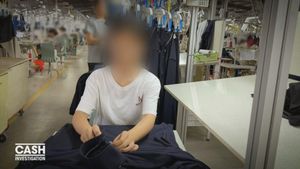Wolfgang Grupp, the former CEO of the German textile manufacturer Trigema, is making headlines with his bold political endorsements and perspectives as Germany gears up for the upcoming Bundestag elections. With 82 years of life experience behind him, Grupp recently revealed his preference for a coalition between the Christian Democratic Union (CDU) and the Free Democratic Party (FDP) during an interview on the YouTube channel of the financial magazine “Der Aktionär.”
Notably, Grupp has always been vocal about his vision for Germany. On being asked about the immediate actions required by the next government, he stated, "We need to bring back confidence so people will invest again in Germany." His sentiment reflects broader concerns within the business community about the country's economic direction.
Grupp’s loyalty to the CDU runs deep. He described himself as "a born Catholic who has voted for the CDU all my life," emphasizing the significance of principled leadership. He firmly supports Friedrich Merz, the current candidate for Chancellor from the CDU, stating, "We need politicians who stand by their decisions." This endorsement remains steadfast even amid controversy, particularly following Merz’s comments about potentially collaborating with the right-wing Alternative for Germany Party (AfD) on asylum policy.
Despite this debate, Grupp remains pragmatic, saying, "If the majority of voters prefer this, we must accept it in a democratic state." His views on the so-called "brand wall"—the delineation between mainstream parties and those considered extreme—indicate his belief in open dialogue across political divides. He emphasized, "We must accept everything, and if a party garners 30 percent support, I cannot say I won’t speak with them." Such statements underline his commitment to democracy, inviting constructive discussions even with those he does not support.
On economic matters, Grupp sees the economy as pivotal, declaring, "The economy is always number one; if the economy is not doing well, everything else is very difficult." He believes Germany must implement policies favoring domestic companies to stem the tide of businesses relocating abroad for cheaper labor costs. According to him, it’s not about exploitation but rather fostering innovation: "We need innovative products to sustain wages here, not just cheap products." His company has consistently produced within Germany, emphasizing the enduring value of the "Made in Germany" label.
Grupp's commitment to producing quality domestic goods is reflected in his business history, leading Trigema from debt to becoming one of Germany’s largest T-shirt manufacturers. He insists on the need for Germany to adapt, stating, "We should not build the cheapest but rather the most innovative cars." This forward-thinking approach resonates with the current challenges faced by many industries, including the automotive sector, which has been grappling with the need for innovation and adaptability.
Addition to the family dynamic, his daughter Bonita Grupp is venturing her political path as she sits on the local council for the CDU, reinforcing the family’s political legacy. Similarly, Wolfgang Grupp junior also championed policy changes, advocating for reduced bureaucracy and incentives for older workers to ease skill shortages facing the industry. Their actions not only represent the familial bond within Trigema but also reflect on Grupp’s influence on the next generation.
Surveying the political scene as the elections draw near, Grupp acknowledges the uncertainty surrounding the FDP, who is currently polling at just 3 to 4 percent. Yet, he holds onto the ideal of productive partnerships, stating, "Everyone must form their own opinion and can vote as they wish.” His perspective suggests he supports individual agency in political decisions, even encouraging dialogue and consideration among varying political ideologies.
Looking forward to 2025, Grupp’s hope is for unity and constructive engagement among politicians, stating, "We should all stop fighting and at least accept differing views." This sentence encapsulates his overarching philosophy: the importance of collaboration over division.
Wolfgang Grupp, with his extensive experience and strong convictions, continues to shape discourse on both business and politics. Anticipated as Germany heads toward the next elections, his endorsements and opinions promise to resonate within the public sphere, showcasing the intertwined nature of community values, corporate responsibility, and political advocacy.



